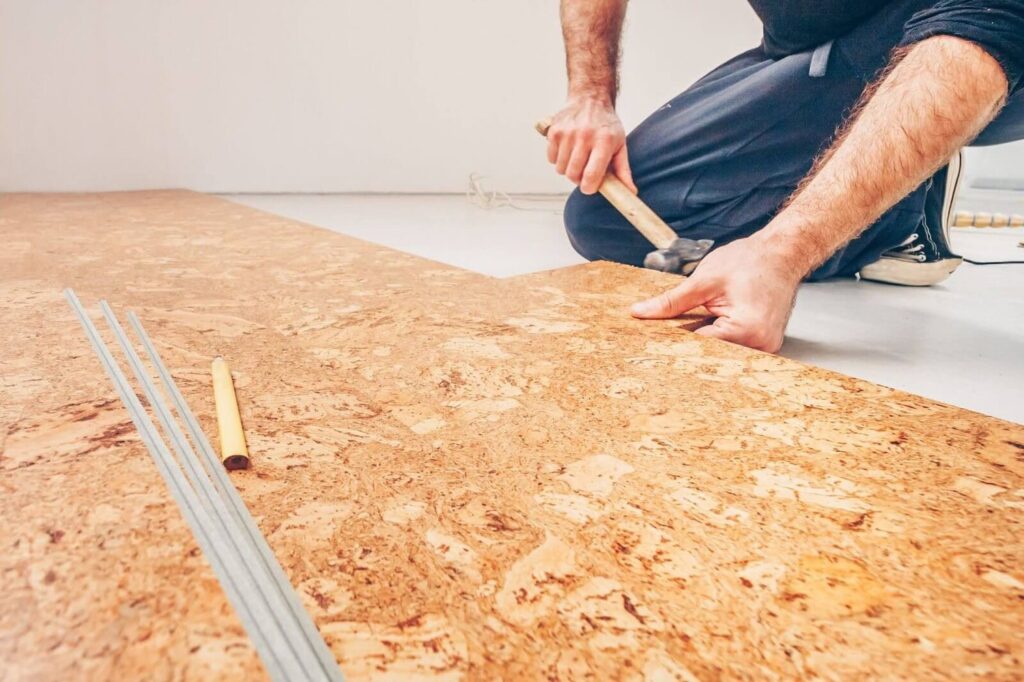Cork flooring is a soft flooring option that’s often overlooked, but its environmental benefits and high comfort make it a great choice for businesses and homes in Nashville. Read on to learn exactly how cork flooring can work for your needs.
WHAT TO KNOW ABOUT CORK FLOORING
CORK FLOORING: A PRACTICAL AND STYLISH OPTION
Cork flooring is made from the bark of the cork tree, which is ground up with other materials like resin and compressed into tiles or planks. Cork is a spongy, soft material that is notable for its comfort and excellent support. Since cork wood is blended with resin, its color and style can be varied considerably, giving people with a flair for interior design a lot of options. The natural pattern of cork flooring can bring together a rustic style or accent a more modern aesthetic when dyed dark or bright colors. Cork is softer than wood flooring but almost as durable as traditional hardwoods.
Cork flooring has many pros and cons beyond style. Cork is tough against scratches and dents despite its more malleable properties. Because of how cork flooring is formed and coated, it’s also waterproof—much more so than hardwoods. Provided they’re installed correctly, cork flooring can resist spills and keep the subfloor safe when well-maintained. Cork flooring is also hypo-allergenic, unlike carpeting, making it the softest option that can provide this level of indoor air quality. Cork is naturally a great insulator, holding heat. This means that your feet won’t be so cold on your floors this winter, and your room’s ambient temperature might actually go up a bit.
There are some downsides to cork, however. For one, cork flooring doesn’t last quite as long as hardwood floors or other soft options like vinyl or linoleum. The average cork floor lasts about 15 years before it needs replacing. Additionally, cork flooring doesn’t work well in homes with large pets like dogs because their nails can damage the flooring. While it’s durable, cork flooring isn’t immune to scratches. However, the benefits of cork flooring outweigh the downsides in most situations. This is especially true when it comes to cork’s environmental footprint.
THE SUSTAINABLE BENEFITS OF CORK FLOORING
So how is cork flooring sustainable? Besides being cheaper than hardwood flooring in almost every scenario, cork is harvested in a unique, eco-friendly way. Since cork is made from the bark of a tree, it can be gathered without killing the tree. Cork farms remove cork in a way that’s safe for the tree and allow the bark to re-grow, harvesting it again later. This makes cork the only truly renewable flooring material. Cork flooring can be recycled. While it isn’t usually reused to make more flooring, the cork from removed cork floors can be used for other purposes by recycling programs across the country. Since cork makes a great insulator, it can also lower heating costs, especially if there’s a lot of it in your home or business. The environmental benefits of cork flooring are huge, and for local Nashville businesses, that sustainability can help offset your carbon footprint. Cork can actually be recycled into natural compost or mulched, meaning that it can go right back into use for your home or business once you do need to replace it in the future.
No matter your needs, cork flooring can often work to enhance a space and lower your carbon footprint. For the best commercial and residential cork flooring selection and installation, contact the professionals at Ozburn-Hessey Company.




